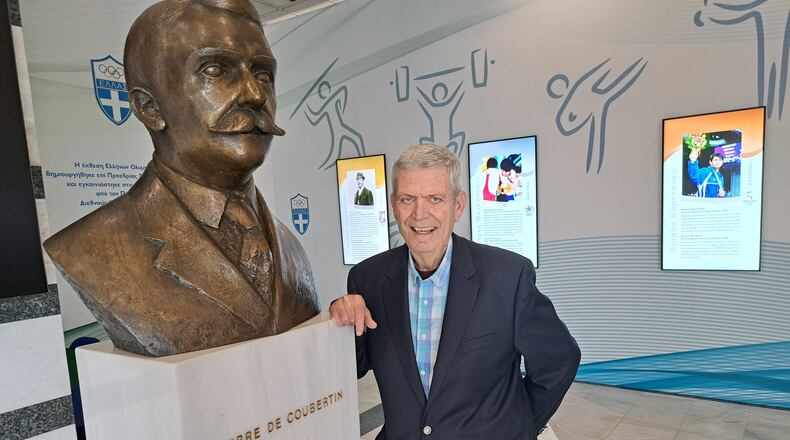Ed Hula, one of the world’s most-traveled sports reporters, created his own digital news site in the run-up to the Atlanta Olympics, which put him ahead of the game, and ahead of the Games.
The Hula Report was born in Atlanta before the first web browser, before hypertext, back when Google was just a twinkle in Sergey Brin’s eye.
Starting out in 1992 as a faxed report, then an email-only newsletter, it was rebranded as Around the Rings, and went online in 2000. It covered everything from the business of the Olympics to results from individual events and athlete profiles.
It was a bold experiment, and it worked.
Hula eventually had a staff of 20 including his wife Sheila (who he met when they were both working at CNN) and his son Edward III.
“It was $450 a year for a domestic subscription, and it was a little bit of a sell at first,” said Hula in an interview last week with The Atlanta Journal-Constitution. “I think our content spoke for itself, and within that rarefied world — it’s a limited universe of people in the Olympic industry — we fought on and got a lot of attention. It was fun to be kind of the baby crawling along on the internet while everyone else was making the discovery of AOL, then Compuserve.”
Subscribers to his online publication and his work on radio allowed Hula to reach a wide audience, to travel to Olympic cities around the globe, and to make himself one of the most knowledgeable writers on the business of the Games.
On Friday Hula will travel to Lausanne, Switzerland to be honored by the International Olympic Committee as “the world’s leading news source for the Olympic Movement.”
He will receive the Pierre de Coubertin Medal, named after the father of the modern Olympic Games. It is described by the IOC as “among the rarest honors bestowed by the organization,” which is given to “educators, writers, sports executives, cultural figures, corporate leaders and others, including Olympic family members, who exemplify the Olympic spirit and its ideals through exceptional service to the Olympic Movement.”
The medal has been awarded only a few dozen times since it was created in 1997, and Hula is only the fourth American to receive the honor. (He is also the second Atlantan, after George Hirthler, an expert on preparing Olympic bids, and the biographer of Coubertin.)
“I was pleased that someone was thinking of us, that they realized we made some sort of mark, some sort of contribution to the flow of information about the Olympics,” said Hula.
Hula, 71, traveled to Olympia, Greece, last week, where he planned to speak at the International Olympic Academy. It was to be his first trip in four years, after the pandemic slowed down his traveling. It was to be his first trip in four years, after the pandemic slowed down his traveling.
Two years ago he and Sheila sold Around the Rings to Argentinian website Infobae. Last year they moved from Atlanta to Mount Dora, Florida, near Orlando. Both of them made the trip back to Atlanta recently to pose in front of the CNN Center with hundreds of other CNN alumni, as the company prepares to move its downtown headquarters back to its Techwood offices.
Institutions come and go, said Hula. “You have to change or be changed.”
In Greece, he will speak to a group of young Olympic Ambassadors about changes to the Games, which next year in Paris will include, for the first time, breakdancing.
Hula watches with amusement as different disciplines, from cheerleading to sheep shearing, are promoted as potential sports for future Olympic games, but he accepts the changes as beneficial, and necessary.
He points out that some sports come and go.
“The people who practice pentathlon around the world, I don’t think their numbers are growing by leaps and bounds,” he said. “There are fewer and fewer.” (For the non-fan, the modern pentathlon consists of horseback riding, shooting, fencing, swimming and running.)
Of the move to include breakdancing he said, “I can understand why they’re doing it. They need to try different things. This is a real popular endeavor that young people really like to do. There can be rules set up, the competition can be fairly administered and the judging fair, and all that. So why not?”
About the Author
Keep Reading
The Latest
Featured



